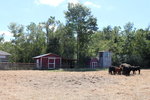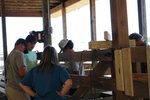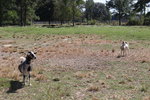BAY MINETTE — When David Garrett came to Baldwin County High School as the new Agriculture teacher in 2015, he told Principal Craig Smith that within two years' time there would be so many …
This item is available in full to subscribers.
Please log in to continue |



BAY MINETTE — When David Garrett came to Baldwin County High School as the new Agriculture teacher in 2015, he told Principal Craig Smith that within two years' time there would be so many students interested in the FFA program that the school would need to hire a second teacher.
In 2017, Andrew Jones came on board as the second agriscience teacher.
"I had 35 to 40 kids in every class at that time, and we were just building the program, and everybody wanted to be part of it," Garrett said. "Mr. Jones came on board, and we have just continually grown."
Garrett said his first year was the lowest participation in the program, due to it being new. This year, over 200 students are enrolled.
And the instructors aren't planning to slow down.
A working farm, on campus?
"I think the thing that makes our program unique is the fact that we have a working farm on campus," Garrett said. "We have cattle that the students break, train, feed and give baths. We treat them 100% just like they are show stock, and the students do all of that work. We just help them and advise them."
Students who have zero cattle background have the opportunity through the class to learn all there is to know on caring for their own cattle farm. Garrett said program students will stay after school, come on the weekends and even head to the school during summer and winter breaks to feed and care for the animals on the farm.
"They have to spend lots of their own personal time coming up here and taking care of these animals," he said. "We partner with some farmers down in Summerdale, and they give us their calves and we take them for typically six to eight months so students can work with these cows."
Students feed the cows, vaccinate them, castrate them and ear tag them.
"We do everything that a regular cattleman would do on his ranch, right here at the school, and the kids get 100% hands-on experience with it," Garrett said.
The farm houses more than cows. Students get experience working with goats, chickens and even a horse, right on school campus.
Student built; student maintained
When first seeing the on-campus farm, Garrett said something most people don't realize is that it is largely student built and maintained. The farm began as a way to give students opportunities they wouldn't necessarily get in other programs or at home, Garrett said. Offering them the chance to build fences, care for the animals and think critically is something both Garrett and Jones feel prepares students for the future.
"Our students learn how to be self-sufficient in owning their own property and homes," Jones said. "I like to believe that every kid who leaves our program will be able to keep some money in their pocket when they graduate because they'll have the skills that are necessary to fix electrical wiring in their house, do small plumbing jobs and do small welding projects. They can build fences; they can care for livestock."
Jones said students often find ways to repurpose things others are throwing out, showing them ways to save money through the skills they have obtained through the class.
"Some of the things that we've done on the farm, people don't understand that students did all this," Garrett said. "They think it's just me and Mr. Jones working on it, but it's not. There's no way we could accomplish this without our kids."
Life skills for whatever the future brings
Whether choosing college or a career, working in agriculture or not, Garrett said the program will benefit the students who go through it.
"The general observation is to go from beginning all the way to the end where you're using your agricultural classroom, SAE (Supervised Agricultural Experience) project and your FFA Leadership Program to form a student who is well-rounded and is ready to go into the workplace as a qualified worker that is willing to work, knows and understands what work is," he said.
College-bound students are eligible for scholarships, while those heading into the workforce are better prepared.
"That's the thing with our program, we get different kids down here," Garrett said. "We get the kids who are not necessarily looking for a college pathway. They're looking for a pathway that is going to take them to a job that they're going to be able to get paid a decent wage for, and a lot of them are looking for something that they can stay with for a long time."
Off the farm
Learning takes place off the farm as well.
The BCHS FFA hosts two blood drives a year. During National FFA Week, students arrive at school at 7 a.m. to hand out snacks and drinks to bus drivers as they pull on campus.
"We do lots of community service and outreach programs," Garrett said. "People will call us and just ask if we can help with something, and most of the time we do."
The BCHS FFA often heads to Summerdale to help out on the farms where their cattle is lent from as a way of saying thanks, Garrett said.
This year, the BCHS FFA finished third in the district in District Land Judging and will be going to the state competition next March. Only to top four in each district head to state, Garrett said.
To keep up with everything the BCHS FFA is doing, both on and off the farm, follow along on Facebook and Instagram.